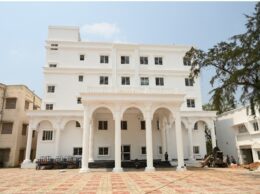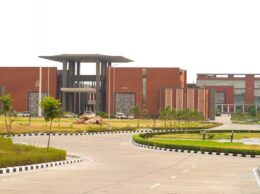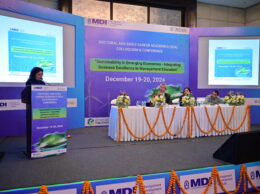Roorkee, 18th June: Indian Institute of Technology Roorkee students had the honour of interacting with the Honourable Prime Minister Shri Narendra Modi.
Recently, Prime Minister Narendra Modi spoke to young innovators and startups, who have turned out to be the “job creators” of the country. The Prime Minister made these remarks during an interaction with thousands of young entrepreneurs who have made a mark in the startup ecosystem. During the interaction, he emphasized on the development of the startup ecosystem in Tier 2 and Tier 3 zones of India, leading to employment generation and innovation. He also said that 45% startups in the country are now started by women and an average startup today employs 12 people. The program concluded with a two-minute video encouraging the youth of the country to become employment generator.
During his address, Shri Narendra Modi interacted with Dr. Sidharth Arora, who has a Ph.D. in Biotechnology from IIT Roorkee. He has developed a novel solid-state fermentation bioreactor to produce industrial enzymes. Inspired by his research output and subsequent funding from government agencies, he has founded Fermentech Labs Pvt. Ltd., a start-up which operates from TIDES Business Incubator, IIT Roorkee.
Speaking about the importance of this interaction, Prof. Ajit K. Chaturvedi, Director, IIT Roorkee, said, “The interactions will not only inspire Dr. Arora to successfully scale-up the bioreactor technology but also urge more PhD,s PG and UG students to embark upon the entrepreneurial journey to contribute towards nation building”
While explaining the start-up idea to Prime Minister Modi, Dr. Arora said, “We buy agricultural waste from farmers and through Solid State Fermentation (SSF) technology, we produce enzymes”. He added, “We got help from government’s ‘Start-up India’ initiative. Through this, young entrepreneurs like me get support in mentorship, funding and market access”.
Fermentech Labs is involved in the production of industrial enzymes of commercial interest through SSF. For this purpose, a novel SSF bioreactor is used which operates at a high substrate loading rate (59.2 %,v/v) in a strict aseptic environment. It also facilitates on-line measurement of cell biomass and bed temperature.
Speaking about the start-up, Prof. Sanjoy Ghosh, Associate Professor, Department of Biotechnology, IIT Roorkee, and Chief Scientific Advisor of the company, said, “We have filed patents for both phytase enzyme and the solid-state bioreactor. Dr. Richa Rani and Dr. Sidharth Arora have heavily contributed in this project while working as Ph.D. scholars under my guidance. We have an aim to commercialize both the products (the bioreactor and the enzyme) and with that aim we have established the start-up, Fermentech Labs Pvt Ltd., with grant-in-aid from BIRAC, Government of India.
He further added, “The aim is to develop indigenous technology and products involving rural people which is to be sold/licensed in India and abroad and thereby improve rural economy”.
Presently the company is involved in the production of two enzymes i.e., phytase and cellulases at lab scale. Phytase breaks inositol 6-phosphate, an anti-nutritional compound present in the animal feed to make phosphate and other important vitamins, amino-acids and minerals available to the animal, thus, circumventing the need for additional nutrients. Poultry, cattle and fisheries industry are huge beneficiaries of phytase. Cellulases have a multitude of industrial applications; from use in commercial food processing in coffee to use in textile industry and laundry detergents to use in the biofuel industry.
Another mission of the company is to help increase the farmer’s income and create a sustainable environment. Around 3-4 tonnes of agro-waste can be procured from an acre of agricultural land, which has the potential to increase the farmers income by 15-20%. The agro-waste are pretreated and fermented in our reactor to produce enzymes. This will not only help in mitigating air and soil pollution due to the burning of agro-wastes but also provide the farmers with a mode of disposal of agro-wastes as well as become a potential source of additional revenue.









